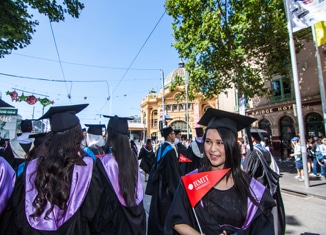Whether the intention to study an MBA came first or the desire to pursue a career focused on sustainability and changing the world did, two Executive MBA graduates from RMIT have told MBA News that the program is intrinsically geared to create leaders who can move the needle in favour of sustainable business.
Leigh Ashlin, Managing Director of homegrown startup Simbl and James Natsis, CEO of Apricot Consulting, both graduated from RMIT’s Executive MBA and have confirmed that there’s plenty of opportunity for likeminded business leaders to take charge and help Australian businesses “walk the walk” when it comes to sustainable business practices.
‘A Lot Of Room’ In The Sustainability Space
Leigh said that while his startup Simbl, due to launch in early 2023, is focused on precycling and offering businesses and consumers a tangible service that quantifies their contribution to environmental, social and governance concerns (ESG), “there is a lot of room in the sustainability space for other businesses.”
“There’s so many things you can do and look at especially when you look at waste as a commodity,” he said.
Using his own business as an example, Simbl offers manufactures QR code technology to help their consumers identify exactly how to dispose of waste from their products with an added cryptocurrency incentive for consumers every time they recycle an item correctly.
By creating clean or refined commodities upstream, Simbl allows companies downstream to make waste more valuable and profitable in their businesses.
“Take your average recycling centre in Australia. Right now, due to co-mingling and inconsistencies with what is recycled by consumers, only about 30% of items end up being recycled by sorting centres. Our technology can help ensure that these same sorting centres save up to 70% of recyclables – a win-win for everyone,” said Leigh.
James echoes a similar sentiment of an industry with untapped potential. He confirms that his consultancy, which has already worked with Transurban, Chemist Warehouse, a series of universities and leading utility companies, anticipates growing demand for their full suite of services, including ESG, leadership and change strategies.
Growing Demand To Incorporate Sustainability in Masters Programs
James and Leigh aren’t alone in their desire to shape careers around the growing trend for sustainable business.
MBA News recently reported the surge in demand from students for sustainability-focused programs, and the demand is matched by employers worldwide, according to McKinsey in the US, due to global sustainable investment topping $30 trillion in 2019 – a jump of 68 per cent since 2014.
Bethany Patten, Senior Associate Director of the Sustainability Centre and M.I.T Sloan School of Management said that demand for workers who understand ESG will likely continue to grow, with businesses needing to hire people to finance renewable energy projects or disclosing the risks faced from climate change in particular,
It Starts With A Sustainability Epiphany
They may have studied the same qualification at the same university, but the decision to pursue more meaningful careers couldn’t have been at more divergent points in their lives for Leigh and James.
James was always attracted to socially conscious employment and had the opportunity to lead a not-for-profit early in his career. When that not-for-profit experienced significant growth under his leadership, James realised he wanted more – which for him meant jumping over to the corporate world.
“There are ways of getting to the top without an MBA, but what the RMIT MBA was able to do for me was accelerate my pivot into corporate and gave me the language that I didn’t have, to gain the influence I needed to be able to do bigger and better things,” said James.
In contrast, Leigh found himself venturing into more ethical career endeavours after graduating with his Executive MBA, largely due to the compounding influence of his socially conscious kids.
According to Leigh, his sense of meaning and purpose was awoken gradually over time as his children became more passionate about social and environmental issues.
“My third child became a passionate recycler, yet after moving back to Australia from abroad, our family noticed we didn’t have the right tools to translate a person’s passion into meaningful, purposeful action,” said Leigh.
“It (the MBA) gave me the agency to back myself and my thinking. It gave me more belief that I can structure my ideas and thoughts and talk about them with the confidence that I didn’t have before my MBA,” said Leigh when asked about how the program helped him with his career and launching his startup.
An Executive MBA With A Sustainability Focus
For James, RMIT stood out as the right provider for his goals because of elements such as a focus on design thinking, the ability to solve complex business problems for ethically-minded companies, and a reputation for industry-based learning.
“As a leader, I was more enamoured by a provider that would be able to offer the practical element over the theory alone, and RMIT had a reputation for industry-based learning,” said Leigh.
The Executive MBA Changed My Thinking
Leigh is convinced he has tangible proof that the RMIT Executive MBA is responsible for changing his personality.
“We were asked to do a personality test at the start of our MBA and towards the end of the program,” said Leigh.
“I went from being scored as a rational thinker in the beginning to having the personality of a leader by the end of my program. I had changed from being this guy that was ticking boxes and doing things, to become a person that thought more broadly about the world, people and how you can bring people together to do things,” he said.
A Degree That Builds Your ESG Knowledge
James was already aware of individual concepts of ESG because it was quite topical and already a part of his consultancy’s offering when he started his Executive MBA. Still, he was able to build on his ESG knowledge during the program.
“The clouds clear, and you start to see ESG more clearly – it gave me a bit more clarity as to where this could go,” said James.
This extra knowledge was instrumental in James pivoting his organisation from solely focusing on providing businesses with social impact and leadership advice to offering fully integrated services in ESG, leadership and change.
It also helped him differentiate the business model for Apricot Consulting from others because the services are also designed to be delivered independently of each other.
Upon completing their MBAs, both Leigh and James feel better equipped to tackle the task of leading businesses in the sustainable business space.
With an Executive MBA from RMIT, it seems that graduates are given the opportunity to enter into leadership positions where they can make a real difference when it comes to sustainability.
If you’re interested in pursuing a career in this field, an Executive MBA from RMIT might be the perfect place to start.







